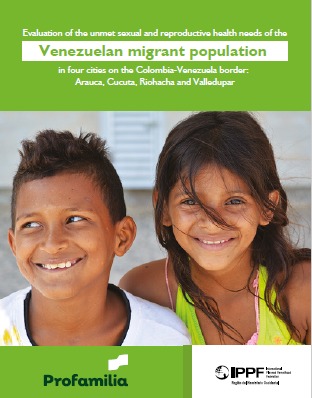
Evaluation of the unmet sexual and reproductive health needs of the Venezuelan migrant population in four cities on the Colombia-Venezuela border: Arauca, Cucuta, Riohacha and Valledupar
| Colaborador: | Asociación Probienestar de la Familia Colombiana - Profamilia- (Traductor) |
Materia:360 - Problemas y servicios sociales; asociaciones
Clasificación Thema::JBFW - Sexo y sexualidad, aspectos sociales
MBPA - Atención médica primaria
LBBL - Derecho internacional público: Derecho de la salud
Público objetivo:General / adultos
Disponibilidad:Disponible
Estatus en catálogo:Próxima aparición
Publicado:2019-05-14
Número de edición:1
Número de páginas:98
Tamaño:22x28cm.
Encuadernación:Tapa blanda o bolsillo
Soporte:Impreso
Idioma:Inglés
Libros relacionados
Presupuesto Estratégico en Propiedad Horizontal: Guía para Administradores Experimentados - Villarraga Cabrera, David Augusto
Narrativas y matices: Relatos colectivos que resaltan el componente humano y comunitario de la Proyección Social - Castellanos Triviño, Héctor Rafael; Contreras Castro, Daniel Alejandro; Láskar Acero, Hernán Eduardo; Araujo Medina, Laura Lorena; López Ortiz, Lili Ariana; Santacruz, Angela María; Morales Pacagüí, Luz Mila; Botero Guzmán, Jhonny Alberto; Aguirre Trejo, Mariana
Narrativas y matices: Relatos colectivos que resaltan el componente humano y comunitario de la Proyección Social - Castellanos Triviño, Héctor Rafael; Contreras Castro, Daniel Alejandro; Láskar Acero, Hernán Eduardo; Araujo Medina, Laura Lorena; López Ortiz, Lili Ariana; Santacruz, Angela María; Morales Pacagüí, Luz Mila; Botero Guzmán, Jhonny Alberto; Aguirre Trejo, Mariana
Cuidando Ando Cartilla Guia Niños Segunda Infancia Edades: 7-10 Años Fundación ZION Programa Cuidando Ando - Fundacion ZION
Reseña
Evaluation of unmet sexual and reproductive health needs of the Venezuelan
migrant population in four cities on the Colombia-Venezuela border
While one out of 30 people in the world is displaced or a refugee, in
Colombia one out of 46 people is a Venezuelan migrant. At the end
of 2018, 1,032,016 Venezuelans had migrated to Colombia. During 2018, the
migrant population in the states along the Venezuelan border increased by almost
one million people (418%). Arauca, César, La Guajira and Norte de Santander
received and hosted nearly two-thirds of the migrant population that has come to
Colombia (Colombia Migration, 2018).
Venezuelan migrants arrive in the country with multiple unmet Sexual
and Reproductive Health (SRH) needs. The profile of the Venezuelan
migrant in Colombia is of men and women, particularly young adults and adults
between 18 and 59 years old. Existing SRH needs have been exacerbated by
this regional crisis. Despite the capacity of Colombian institutions, this does not
translate into effective and timely access to comprehensive sexual and reproductive
health services for these women and men. To guarantee access, resources are
needed, as well as the elimination of barriers for the migrant population. In this
sense, communication strategies are needed to attack misinformation about SRH
in migration contexts. There are large inequalities between irregular and circular
migrants compared to regular migrants and those in the process of regularization.
Responses and interventions in SRH must be targeted to take into account the
migrant population’s circumstance and meet their needs.




